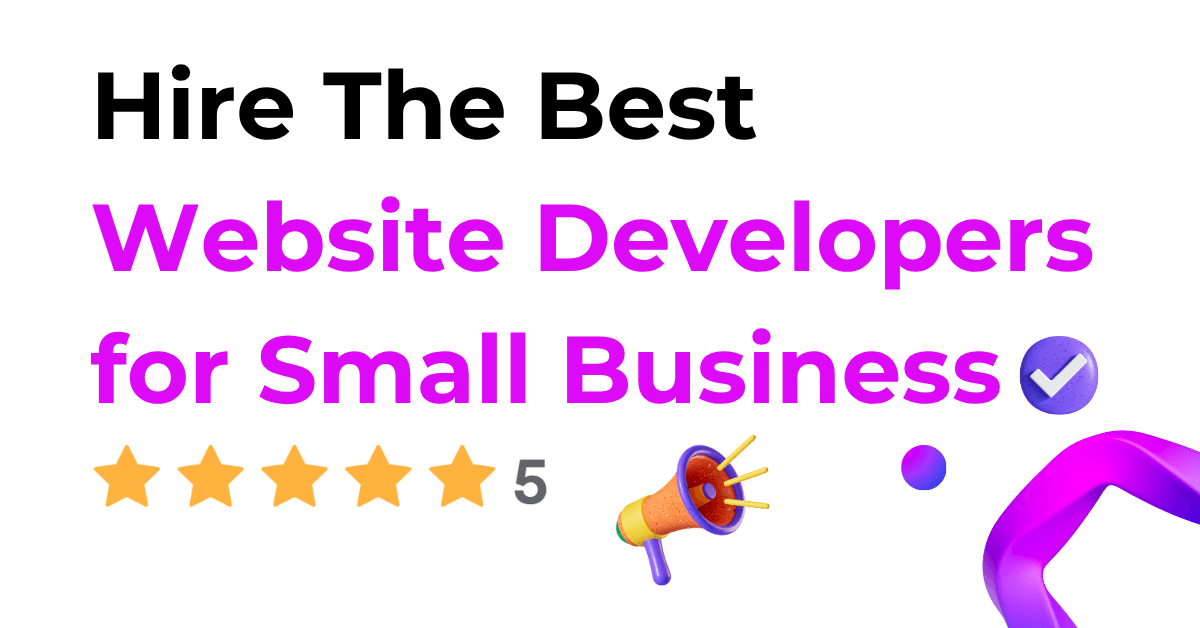Discover how to hire the best website developers for your small business. Learn tips, platforms, and what to look for in a top web development expert.
In today’s digital-first world, your website is often the first impression your business makes. For small businesses, especially, having a professionally designed, user-friendly, and functional website can mean the difference between gaining a loyal customer and losing them to a competitor. But hiring the right website developer isn’t always easy, especially if you’re working with a limited budget or don’t have technical expertise.
The process of hiring a web developer goes far beyond just finding someone who can write code. You need a developer who understands your brand, your audience, your business goals, and how to translate that into an effective online presence. With so many options — from freelancers to agencies — it’s crucial to know what to look for, where to search, and how to evaluate candidates to get the best results.
In this guide, we’ll walk you through everything you need to know about hiring the best website developers for small businesses. Whether you’re starting from scratch or revamping an outdated site, this article will help you make informed decisions that align with your goals and help your business grow online.
Table of Contents
Why Hiring the Right Website Developer Matters for Small Businesses
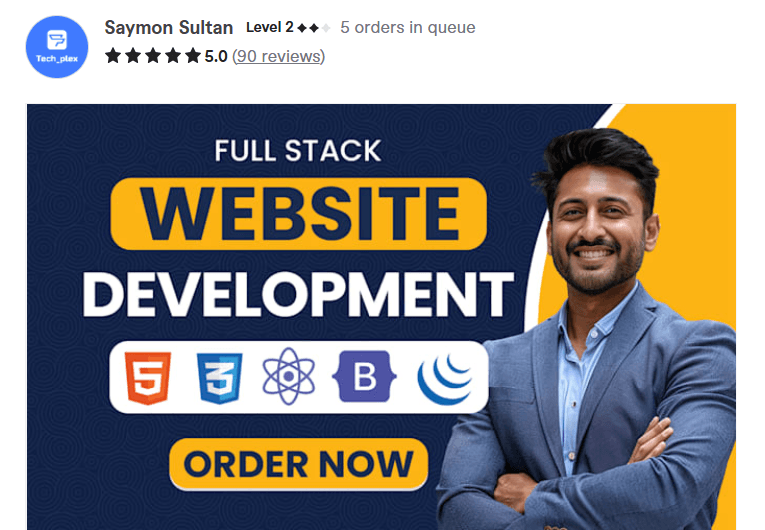
Hiring the right website developer is one of the most important investments a small business can make. In today’s digital-first world, your website is often the first impression potential customers get, and first impressions matter. A skilled web developer doesn’t just build a website; they create a fast, secure, user-friendly platform that reflects your brand and converts visitors into customers.
The Role of a Website in Business Success
For small businesses, a website is more than just an online presence — it’s your 24/7 salesperson. It can:
- Attract and retain local and global customers
- Showcase your products or services professionally
- Improve credibility and trust
- Generate leads through contact forms, calls-to-action, and booking systems
- Support SEO strategies to drive organic traffic from Google
A poorly built website, on the other hand, can drive potential customers away, damage your brand reputation, and even hurt your search engine rankings.
Common Mistakes Small Businesses Make When Hiring Developers
Many small businesses rush into hiring without a clear plan or understanding of what they need. Here are some frequent pitfalls:
- Choosing the cheapest option without considering quality or experience
- Failing to check past work or client reviews
- Hiring someone with limited knowledge of SEO or mobile optimization
- Not setting clear goals or expectations
Avoiding these mistakes by taking a strategic approach to hiring can save time, money, and headaches in the long run.
Types of Website Developers You Can Hire
Choosing the right type of website developer is crucial for your small business. Depending on your budget, project size, and long-term goals, there are several types of developers to consider. Each comes with its own advantages and challenges.
1. Freelancers
Freelance website developers are independent professionals who work on a per-project basis. They are often a great choice for small businesses with limited budgets or one-time projects.
Pros:
- More affordable than agencies or full-time hires
- Flexible schedules
- A wide range of talent is available globally
Cons:
- May juggle multiple clients at once
- Less accountability than an agency or an in-house team
- Quality can vary greatly — vetting is essential
Best for: Small businesses that need a cost-effective solution for a simple website.
2. In-House Developers
Hiring a full-time in-house developer means bringing someone on your payroll who is dedicated to your business only.
Pros:
- Full control over project direction and timelines
- Faster communication and collaboration
- Long-term maintenance and updates become easier
Cons:
- High upfront cost (salary, benefits, tools)
- May not be fully utilized if your needs are small or infrequent
- Recruiting and onboarding take time
Best for: Businesses with ongoing development needs or larger digital projects.
3. Web Development Agencies
Agencies are companies that offer complete website development services, often including design, development, SEO, and support.
Pros:
- Professional project management and structure
- Team of experts with diverse skills
- Scalable — ideal for complex or custom websites
Cons:
- Higher cost compared to freelancers
- Less flexibility with project changes or timelines
- You may not work directly with the developer
Best for: Small businesses that need a high-quality, custom website and are willing to invest more upfront.
4. DIY Website Builders (Bonus Option)
While not developers per se, some small businesses consider using platforms like Wix, Squarespace, or Shopify to build their own websites.
Pros:
- Very low cost
- No coding required
- Fast launch
Cons:
- Limited customization and scalability
- May lack advanced SEO or performance features
- Time-consuming if you’re not tech-savvy
Best for: Very small businesses or startups that need a quick online presence with minimal cost.
Which Option Is Right for You?
The best type of website developer depends on your:
- Budget
- Project scope
- Timeline
- Technical complexity
- Need for long-term support
Take the time to assess your business goals before choosing the developer model that aligns with your needs.
What to Look for in a Great Website Developer
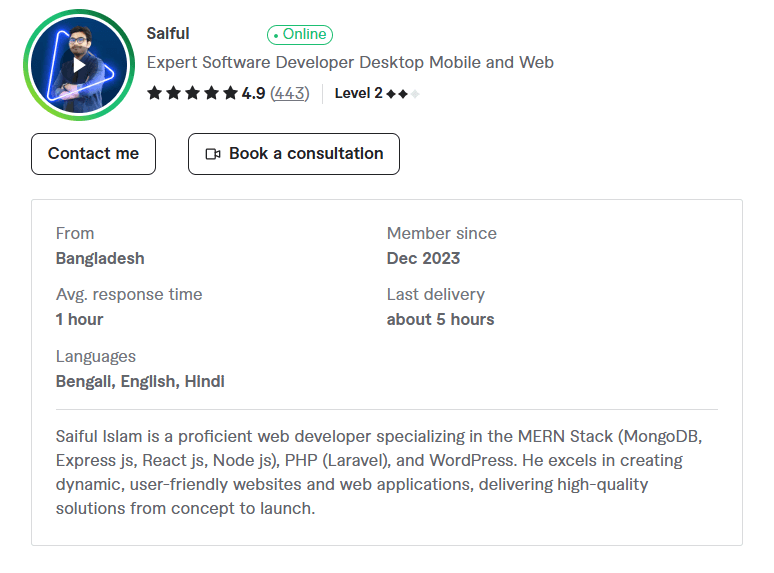
Hiring the right website developer can make or break your small business’s online presence. A great developer is more than just someone who knows how to code—they are a partner in building your digital identity. Below are the key traits and skills you should look for when hiring a website developer for your small business:
1: Technical Skills That Match Your Project Needs
Every small business has unique requirements, so make sure your developer is proficient in the tools and technologies that align with your goals. At a minimum, look for expertise in:
- HTML, CSS, JavaScript – the foundational languages of the web
- CMS platforms like WordPress, Shopify, or Wix, if you need a content-managed site
- Responsive design techniques to ensure your site looks great on all devices
- Page speed optimization and SEO-friendly coding
If your business needs custom functionality, make sure they know frameworks like React, Vue, or PHP for backend development.
2: A Strong and Relevant Portfolio
A developer’s portfolio is a window into their style, skill, and experience. Ask to see past work—ideally similar to your industry or goals. Look for:
- Clean, professional design
- User-friendly navigation
- Mobile responsiveness
- Fast loading speeds
- Functional features (like forms, booking tools, e-commerce elements)
Bonus points if they’ve worked with other small businesses and can showcase how the website improved business performance.
3: Understanding of SEO and Mobile Responsiveness
It’s not enough to build a beautiful website—your site needs to rank well in search engines and be optimized for mobile users. A top-tier developer should:
- Follow basic on-page SEO practices (clean code, meta tags, proper heading structure)
- Compress images and enable caching for fast load times
- Ensure your site passes Google’s Core Web Vitals
- Build a responsive layout that works across all screen sizes
These technical SEO elements are critical for visibility and user experience.
4: Communication, Reliability, and Collaboration Skills
The best developers are also good communicators. They:
- Ask thoughtful questions about your business goals
- Provide clear timelines and progress updates
- Respond promptly to emails and messages
- Are open to feedback and revisions
Especially for small businesses with limited time and resources, working with a dependable, responsive developer can make your project much smoother.
5: Problem-Solving Ability and Proactive Attitude
You want someone who doesn’t just follow instructions, but also suggests improvements and finds smart solutions. A proactive developer will:
- Recommend best practices
- Spot potential issues before they become problems
- Take ownership of the final product
This mindset can save you time, money, and headaches down the line.
✅ Pro Tip:
Don’t just hire based on technical skills. Soft skills like reliability, attention to detail, and a collaborative mindset are equally important, especially if you’re working with them long-term or remotely.
Where to Find Top Website Developers for Small Businesses
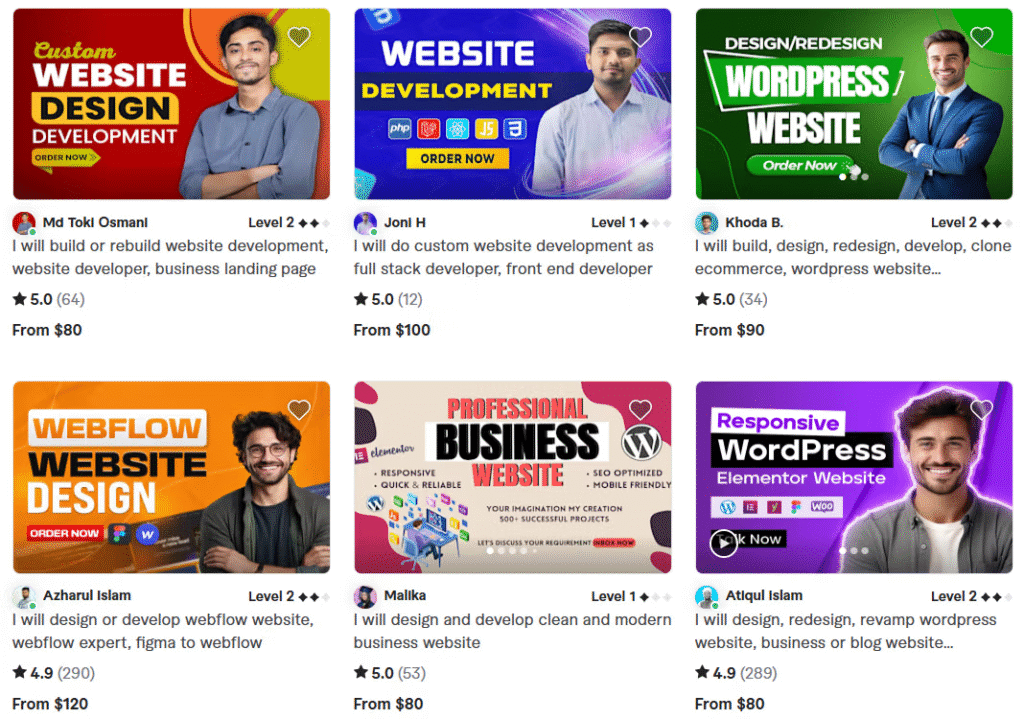
Finding the right website developer for your small business doesn’t have to be overwhelming—if you know where to look. Whether you’re searching for freelance professionals, full-time developers, or agencies, the internet offers a wide range of reliable sources to explore. Here’s a breakdown of the best places to find top-notch website developers.
1. Trusted Freelance Platforms
Freelance platforms have become a go-to solution for small businesses needing flexible, affordable web development services. These platforms allow you to view developer ratings, past work, client reviews, and pricing before hiring.
- Upwork – Offers a wide pool of vetted developers with various skill levels and hourly rates. Ideal for long-term or short-term projects.
- Fiverr – Great for budget-conscious businesses. You can hire developers based on fixed-price packages starting as low as $50.
- Toptal – Known for connecting businesses with the top 3% of freelance developers. A bit more expensive but highly reliable.
Pro Tip: Always check reviews, delivery timelines, and portfolios before making a decision.
2. Developer Communities and Forums
Web developer communities are goldmines for finding skilled professionals. These platforms are where developers gather to share code, collaborate, and even promote their services.
- GitHub – Look for active contributors with strong coding portfolios. You can even contact developers directly.
- Stack Overflow Jobs – Offers access to a vast pool of developers who are actively engaged in solving real-world problems.
- Reddit (e.g., r/webdev) – A good place to network or post job listings where skilled developers might respond.
These platforms may not offer built-in hiring systems, but can help you find passionate, technically sound developers.
3. Referrals and Word of Mouth
One of the most reliable ways to hire a trustworthy developer is through referrals. Ask fellow business owners, colleagues, or even clients if they’ve worked with a skilled developer. Referred professionals often come with proven track records and are more likely to deliver quality work.
Local vs Remote Developers – Which Should You Choose?
Both local and remote developers have their advantages, and your choice should depend on your project scope, budget, and communication preferences.
- Local Developers
Pros: Easier communication, potential for in-person meetings, better understanding of local business needs.
Cons: Often more expensive, limited availability in some regions. - Remote Developers
Pros: More options, often lower cost, access to global talent.
Cons: Time zone differences, reliance on virtual communication.
If you’re running a local business and prefer face-to-face interactions, local developers may be the better choice. For technical expertise and cost savings, consider remote developers with a solid portfolio and communication skills.
Final Tip: Before you decide where to hire from, define your project requirements clearly, such as budget, timeline, design preferences, and platform (WordPress, Shopify, custom-coded, etc.). This will help you match with the right developer faster and more effectively.
Questions to Ask Before Hiring a Website Developer
Choosing the right website developer for your small business isn’t just about technical skills—it’s about finding a reliable partner who understands your goals, communicates clearly, and can deliver results. Asking the right questions upfront can save you time, money, and frustration down the road.
Here are essential questions to ask before hiring a website developer:
1. Can You Show Me Your Portfolio?
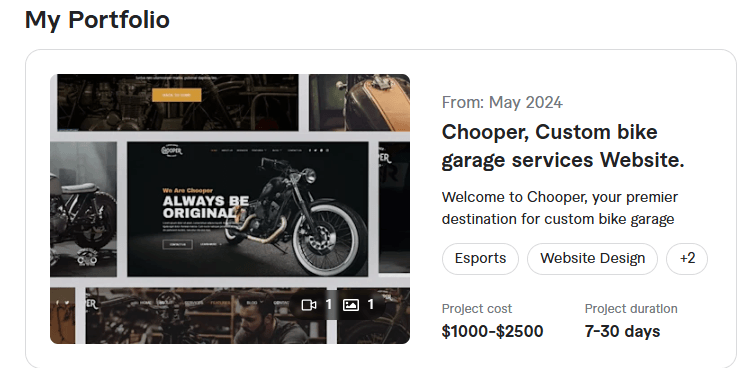
A developer’s past work is one of the best indicators of what they can deliver. Ask for a portfolio that includes:
- Websites built for small businesses like yours
- Live website links (not just screenshots)
- Details on what parts they were responsible for (design, backend, SEO, etc.)
A strong portfolio gives you insight into their design style, technical capabilities, and versatility.
2. What Technologies Do You Use?
Understanding their tech stack helps you evaluate if they’re the right fit for your project. Some common tools and platforms include:
Ensure their tools align with your project needs, scalability goals, and your own comfort level with managing the website post-launch.
3. Do You Understand SEO Best Practices?
A beautiful website that no one can find on Google won’t help your business. Ask:
- Do you optimize sites for speed and mobile responsiveness?
- Do you include basic on-page SEO like meta tags, headings, alt text, and schema?
- Will you submit the site to Google Search Console after launch?
A developer with SEO knowledge can set the foundation for your site to rank on search engines.
4. How Do You Handle Revisions and Feedback?
Miscommunication can lead to wasted time and budget. Make sure you understand:
- How many revisions are included in the price
- Their process for collecting and implementing feedback
- The turnaround time for edits
Clear expectations on revisions help avoid delays and scope creep.
5. Will I Own the Website and Its Content?
Ownership rights are often overlooked. Ensure you ask:
- Who owns the website’s code, design, and content?
- Will I have full access to the hosting and CMS?
- Is there a handover process with documentation?
You should always retain full ownership and control of your business website.
6. What Is the Estimated Timeline for Completion?
Understanding the timeframe helps you plan other parts of your business launch or marketing campaign. Ask:
- How long will it take to complete the website?
- What are the milestones and deadlines?
- What happens if there are delays?
Realistic timelines reduce surprises and keep the project on track.
7. Do You Provide Ongoing Support or Maintenance
Websites aren’t “set it and forget it.” Bugs, updates, and new features will come up. Ask:
- Do you offer post-launch support?
- Is support included or billed separately?
- Do you offer monthly maintenance plans?
Ongoing support is crucial for long-term success and peace of mind.
By asking these strategic questions, you’ll not only find a competent website developer but one who genuinely understands your small business goals and can contribute to your growth.
Cost of Hiring Website Developers: What Should Small Businesses Expect?

Hiring a website developer can be a game-changer for your small business, but understanding the costs involved is crucial for planning and avoiding surprises. Whether you’re launching a new site or revamping an old one, the cost will vary depending on several factors.
Price Ranges for Freelancers vs Agencies
The cost of hiring a website developer varies widely based on the type of professional you choose:
- Freelancers:
Freelance web developers typically charge:- Hourly: $25 – $100/hour (depending on experience and location)
- Per Project: $500 – $5,000 for basic business websites
Freelancers are a great option for tight budgets and simple websites.
- Web Development Agencies:
Agencies often provide a full-service approach with designers, developers, SEO experts, and support staff. Expect:- Project-Based Pricing: $3,000 – $20,000+
- Ongoing Services: Monthly retainers for updates, SEO, or hosting
Agencies tend to be more expensive but offer higher reliability and a more structured process.
- In-House Developer (Full-Time Hire):
This is usually more relevant for businesses with long-term, evolving web needs.- Salary Range: $50,000 – $90,000/year, depending on skill level and location
Budgeting Tips for Small Business Owners
Here’s how to budget smartly when hiring a developer:
- Define Your Project Scope: Know what you need—landing page, e-commerce functionality, blog integration, etc. The more complex, the more costly.
- Get Multiple Quotes: Compare prices and services from at least 3–5 developers or agencies.
- Don’t Forget Hidden Costs:
- Hosting fees ($5–$30/month)
- Domain registration ($10–$20/year)
- CMS/theme licenses (if applicable)
- Ongoing maintenance or support
- Set Aside 10–20% Extra: Always budget for unforeseen changes or enhancements.
Value vs Cost: Why the Cheapest Isn’t Always the Best
It’s tempting to go with the lowest bid, but in web development, you often get what you pay for. Cheap developers may cut corners on:
- Mobile responsiveness
- SEO best practices
- Site speed and security
- Clean code and scalability
Instead, look for developers who balance affordability, transparency, and quality. Remember, a poorly built website can cost more in lost leads and credibility than what you “saved” upfront.
Red Flags to Watch Out For When Hiring
Hiring the right website developer can make or break your small business’s online presence. But just as there are great developers, there are also those who can cost you time, money, and missed opportunities. Here are some key red flags to watch out for when hiring a website developer:
1: Lack of Communication or Delayed Responses
Clear, consistent communication is critical to a successful project. If a developer takes too long to reply to your emails, misses calls, or fails to provide updates, this could be a sign of future issues.
Why it matters: Poor communication often leads to misunderstandings, missed deadlines, and an unfinished or unsatisfactory final product.
2: No Clear Contract or Timeline
If a developer refuses to provide a contract, project scope, or timeline, that’s a big warning sign. Professional developers outline expectations, deliverables, deadlines, and payment terms up front.
Why it matters: Without a written agreement, you have little protection if things go wrong.
3: Unclear Pricing or Hidden Fees
Be cautious of developers who give vague pricing or add unexpected charges later in the project. A reliable developer will provide a detailed quote and explain what’s included.
Why it matters: Budget is crucial for small businesses, and surprise fees can quickly derail your plans.
4: No Portfolio or Verified References
If a developer can’t show examples of past work or provide client references, consider it a red flag. Even if they’re new, they should have sample projects or testimonials.
Why it matters: A portfolio proves their experience and gives insight into their design and technical capabilities.
5: Overpromising Results
Beware of developers who guarantee things like “#1 on Google in a week” or “a complete website in 24 hours” without understanding your business. These promises are often unrealistic or misleading.
Why it matters: A quality website takes time, collaboration, and strategic planning—especially when factoring in SEO and mobile responsiveness.
6: Outdated Design or Development Practices
If the developer doesn’t use responsive design, ignores SEO fundamentals, or insists on outdated technologies (like Flash), that’s a sign they may not be up-to-date.
Why it matters: Your site must meet modern standards to stay competitive and accessible across all devices.
7: Lack of Post-Launch Support
Many developers disappear once the site is live. Make sure they offer some form of support, even if limited, for updates, bug fixes, or training.
Why it matters: Your business needs a partner, not just a one-time service provider.
✅ Pro Tip:
Always trust your instincts. If something feels off during the hiring process, it’s better to pause and reassess before committing.
How to Ensure a Successful Working Relationship
Hiring a great website developer is just the beginning. To truly get the most out of your investment, small businesses must focus on building a strong, productive working relationship. Here’s how to do it right:
1: Set Clear Expectations and Goals
Before the project starts, clearly define what you want your website to achieve. Whether it’s generating leads, showcasing your services, or driving eCommerce sales, your developer needs to understand your business objectives.
Tips:
- Provide a list of must-have features (e.g., contact forms, booking tools, payment gateways).
- Share examples of websites you like for design inspiration.
- Define your launch deadline, budget, and scope from the beginning.
2: Create a Project Brief
A well-written project brief ensures everyone is on the same page. This document should outline:
- Your business background
- Target audience
- Design preferences
- Required functionality
- SEO or performance goals
- Competitor websites
A solid brief saves time, avoids misunderstandings, and gives your developer a roadmap to follow.
3: Communicate Regularly and Effectively
Clear, consistent communication is the foundation of any successful project. Don’t wait until the end to give feedback.
Best practices:
- Schedule weekly or biweekly check-ins.
- Use project management tools like Trello, Slack, or Asana.
- Be honest and constructive with feedback.
- Ask for updates or previews during development phases.
4: Be Open to Professional Advice
While you know your business, your developer understands what works online. Be open to suggestions on layout, functionality, or performance.
For example:
If your developer recommends a faster-loading design or a mobile-first layout, it’s likely to improve user experience and SEO performance — even if it differs from your original vision.
5: Plan for Post-Launch Support and Maintenance
Your website will need ongoing care — updates, bug fixes, and possibly new features as your business grows.
Consider:
- Asking your developer about a maintenance plan
- Defining how future updates will be handled
- Keeping a long-term partnership if the initial project goes well
Pro Tip: Sign a Clear Contract
Make sure your agreement includes:
- Scope of work
- Timeline and milestones
- Payment schedule
- Ownership of code and content
- Support terms
This protects both you and the developer and ensures a smoother collaboration.
A great website doesn’t happen by accident — it’s the result of clear expectations, strong communication, and mutual respect. Treat your developer like a partner, not just a vendor, and you’ll get a better product and a relationship you can rely on for future projects.
Check More Article: 5 Best Freelance Web Designers for Hire on Fiverr
Final Thoughts: Hiring Smart for Long-Term Business Growth
Hiring the right website developer is one of the most crucial decisions a small business can make to ensure lasting success online. A well-designed, user-friendly website not only attracts and retains customers but also builds your brand’s credibility and drives growth over time.
When you hire smart, you’re investing in more than just a developer’s technical skills—you’re choosing a partner who understands your business goals, communicates effectively, and is committed to your long-term vision. This thoughtful approach helps avoid costly mistakes, project delays, and frustration down the road.
Remember, the best developer for your small business isn’t always the cheapest option, but the one who offers a balance of expertise, reliability, and ongoing support. Take the time to thoroughly evaluate candidates, ask the right questions, and set clear expectations from the start.
By hiring wisely, you’ll build a strong foundation for your website that grows with your business, helping you stay competitive, engage customers, and achieve sustainable success in the digital marketplace.
Investing in the right website developer today means investing in your business’s future.
FAQs about Hiring Website Developers
How long does it take to build a small business website?
The timeline varies depending on the website’s complexity and the developer’s availability. Typically, a simple small business website can take anywhere from 2 to 6 weeks. More complex sites with custom features might require 2 to 3 months or longer. Clear communication about deadlines upfront can help manage expectations.
Should I hire a developer or use a website builder?
If you need a highly customized, scalable website with unique features, hiring a professional developer is the best choice. However, for businesses on a tight budget or with simple needs, DIY website builders like Wix or Squarespace can be a quick and cost-effective solution. Keep in mind that developers provide more flexibility and control over SEO, design, and performance.
Is it better to hire a local or remote web developer?
Both options have pros and cons. Local developers offer face-to-face collaboration and may better understand your market. Remote developers often provide cost savings and access to a broader talent pool. The key is to prioritize communication skills, reliability, and experience regardless of location.
What questions should I ask before hiring a website developer?
Ask about their previous work and portfolio, technical skills, experience with SEO and mobile responsiveness, project timelines, revision policies, and post-launch support. Understanding their communication style and availability is also essential to avoid surprises later.
How much does it cost to hire a website developer for a small business?
Costs vary widely based on developer experience, project scope, and region. Freelancers may charge anywhere from $25 to $150+ per hour, while agencies often have higher rates. It’s important to balance cost with quality to ensure your investment delivers a professional, effective website.
Can a website developer help improve my site’s SEO?
Yes, many developers have SEO knowledge and can optimize your site’s structure, speed, and mobile usability. However, for advanced SEO strategies like content marketing and backlink building, you might want to hire a specialized SEO expert in addition to your developer.
